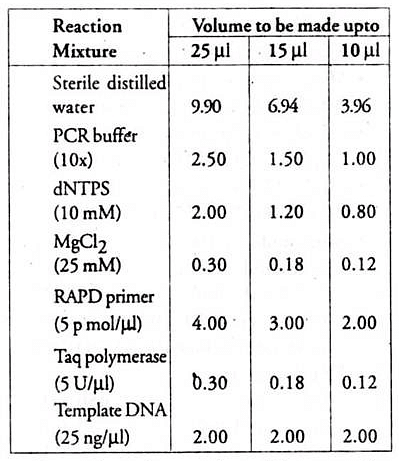UPSC Exam > UPSC Notes > Zoology Optional Notes for UPSC > RAPD
RAPD | Zoology Optional Notes for UPSC PDF Download
Introduction
Randomly amplified polymorphic DNA (RAPD) was developed by William et al. (1990) to detect genetic polymorphism in crop plants. Polymerase chain reaction (PCR) is an in vitro method of nucleic acid synthesis by which a particular segment of DNA can be specifically amplified and modifications in its basic procedure has led to the development of RAPD for detecting variation at nucleotide level.
Principle
RAPD reaction is based on the principle of polymerase chain reaction (PCR), an enzymatic assay for amplification of specific DNA segments in the target DNA.
Requirements
- RAPD random primers 5 p mol/1
- dNTPs (dATP dGTP dCTP and
- dTTP) 10 mM
- MgCl2 15 mM
- Template DNA 25 ng/µl
- PCR buffer10x
- (usually given with Taq polymerase).
- Taq DNA polymerase. 5 U/µl
- Agarose gel electrophoresis reagents.
- Eppendorf tubes (1.5 and 0.5 ml).
- PAGE or Agarose electrophoresis equipment.
- Microcentrifuge.
- Micropipettes (P2, P20, P200, and P1000).
- 0.2 ml thin walled PCR tubes.
- Gel drier.
- —20°C deep freezer.
- Refrigerator.
- Photo documentation system.
- Laminar clean air flow hood.
- U.V. transilluminator.
Procedure:
- Add 2 µl of template DNA in PCR tubes, label and keep them on the rack.
- Prepare reaction mixture in 1.5 ml Eppendorf tubes for required number of reactions. An addition of two tubes should also be prepared to compensate the pipetting loss.
- For more than one primer reaction, mixtures should be prepared separately.

- Keep the tubes on ice while preparing PCR reaction mixtures and components should be added in the sequence indicated above.
- Add 2 µl of reaction mixture to the 0.2 ml PCR tube with 2 µl of template DNA which makes the final volume to 25 µl. Mix well by patting the tube with fingers.
- Centrifuge for few seconds to bring contents to the bottom of the tube (do not use vortex mixer, since it will inactivate enzyme).
Perform PCR reaction in a thermocycler as per programme given below:
- Check the amplified product by running through 1.5% agarose gel stained with ethidium bromide.
- Prepare 1.5% agarose gel with ethidium bromide.
- Add 2 µl of 6x loading dye to 10 pi of PCR product and mix well.
- Load the gel with PCR product along with a molecular weight marker (Lamda DNA/£coRI + Hind III double digest) and run the gel in 1x TBE at 50 V till the bromophenol dye front reaches the end of the gel.
- View the gel using U.V. transillumina- tor. Document the profile using a gel documentation system for further analysis.
The document RAPD | Zoology Optional Notes for UPSC is a part of the UPSC Course Zoology Optional Notes for UPSC.
All you need of UPSC at this link: UPSC
|
198 videos|351 docs
|
FAQs on RAPD - Zoology Optional Notes for UPSC
| 1. What is RAPD UPSC? |  |
RAPD UPSC stands for Rapid Action Plan for UPSC (Union Public Service Commission) exam preparation. It is a strategy or plan that aims to provide a quick and effective way to prepare for the UPSC exam.
| 2. How does RAPD UPSC help in UPSC exam preparation? |  |
RAPD UPSC helps in UPSC exam preparation by providing a structured approach to studying for the exam. It helps in identifying the important topics, creating a study schedule, and managing time effectively. RAPD UPSC also provides guidance on the best resources to use, exam strategies, and tips to improve performance in the exam.
| 3. What are the key principles of RAPD UPSC? |  |
The key principles of RAPD UPSC include understanding the exam pattern and syllabus, setting realistic goals, creating a study plan, prioritizing topics based on importance, practicing previous year question papers, and continuously evaluating and adapting the study plan.
| 4. Can RAPD UPSC be used for other competitive exams apart from UPSC? |  |
Yes, RAPD UPSC can be used for other competitive exams apart from UPSC. While the specific syllabus and exam pattern may differ, the principles of effective study planning, time management, and exam strategies can be applied to any competitive exam.
| 5. Are there any online resources or platforms available for RAPD UPSC? |  |
Yes, there are several online resources and platforms available for RAPD UPSC. These include websites, mobile applications, online courses, and study materials specifically designed for UPSC exam preparation. Some popular online platforms for UPSC preparation include Unacademy, BYJU's, and ClearIAS.
Related Searches















